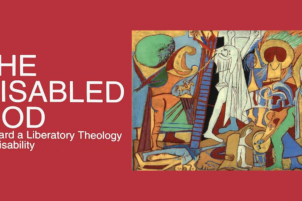
Theresa Soares
In celebration of our newsletter edition on disability and religious education, my colleagues, Shelly Christensen and Ben Bond, invited me to share a brief reflection on my own personal experience, from being a young Catholic with a reading disability in both public and private school, and through my journey of becoming an advocate for disability inclusion in college and now into my career. This opportunity to share my story among our community is not only a privilege, but also a beautiful reflection of the strong culture of belonging that is at the core of our work at RespectAbility. I’m grateful to my colleagues for their invitation and am happy to share my story with you in this special newsletter.
My story begins as a kid growing up in the occasionally sunny, but more often foggy, beachside town of Pacific Grove, California. I had the opportunity to attend public elementary school where I first experienced difficulties learning to read. This challenge came as a surprise to my teachers and family who had otherwise observed that although I was struggling to read, I was bright and enthusiastic about learning, especially having displayed an expansive vocabulary and conversational aptitude for a young person. Through early intervention and the support of my teachers, I was tested through my district, and diagnosed with dyslexia. With the diagnosis came the opportunity to have accommodations and support services for my disability which I desperately needed in order to learn to read and write at grade level and keep up with my peers. School was challenging, and as a young student I remember long hours at the kitchen table after school, struggling to read through my homework, sometimes, I would close my eyes and imagine as a youngster, a place where reading wasn’t so challenging, where I could read like the other kids.
For those reading here who may not have had an opportunity to learn about dyslexia before, I wanted to provide some brief insight into how The Yale Center for Dyslexia and Creativity defines the learning disability, “Dyslexia is an unexpected difficulty in reading in an individual who has the intelligence to be a much better reader…Scientific research shows differences in brain connectivity between dyslexic and typical reading children, providing a neurological basis for why reading fluently is a struggle for those with dyslexia. Dyslexia can’t be “cured” – it is lifelong. But with the right supports, dyslexic individuals can become highly successful students and adults.” In further support of my education, I received accommodations for my disability in a daily Resource class where I worked with a Special Education teacher on my reading skills. Finally, through hard work, determination, and the support of my parents and teachers, by the end of the fourth grade, it was determined that I was finally reading at grade level.
Shortly after, for middle school, my parents transferred me to a Catholic school so I could benefit from a smaller class size, and a learning environment that coincided with our family values and our Catholic faith. While Catholic education can provide students and families a host of benefits, Unfortunately, the school did not offer any services for students with disabilities and did not provide the same level of support for students with disabilities as the public school system. I then, went onto continue my Catholic Education at a college preparatory high school for young women that again, unfortunately did not offer any support services for my disability until the end of my high school career. Throughout my Catholic education without services, although difficult, I still managed to be a good student mainly excelling in extracurricular activities, such as band, sports, and school service clubs.
When it came time to apply to college, I requested testing accommodations for the SAT and ACT tests, based on an updated diagnosis I obtained outside of my Catholic school in preparation for college. Unfortunately, I was denied by the testing companies based on a lack of recent history of receiving accommodations throughout the religious portion of my education. This unfortunately negatively impacted my scores, which in turn influenced the types of colleges I was eventually accepted to. I remember holding the denial of accommodations letter in my hands, while sitting on the floor of my living room, knowing of the impact this would have on my future. At the time of my application for undergraduate studies, most colleges were not yet test optional, and these scores carried a lot of weight in admissions and eventually obtaining awards such as merit-based aid.
Not only concerned for myself and my future, in that moment of desperation at 17 years old, I wondered what kind of impact instances of injustice such as this had on other’s life outcomes, I thought of people with other disabilities, different from my own and people who come from backgrounds that looked different from own, I had more questions than I had answers and it was this passion and curiosity that eventually led me to pursue a course of undergraduate study which allowed me to explore these social questions while also developing the courage to become a lifelong disability advocate.
In reflecting on my own experience, religious educational institutions have something unique to offer parents and students, however these benefits shouldn’t leave parents of disabled students in a state of compromise, forced to choose between services and accommodations, and faith community. I offer my story as a case study for why religious education institutions need to follow the Individuals with Disabilities Education Act (IDEA) as a moral mandate to support disabled students equitably.







